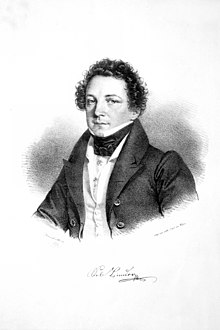Sebastian Binder (singer)

Sebastian Binder ( 1792 in Prague - January 15, 1845 in Pest ) was an Austrian opera singer ( tenor ) and singing teacher .
Life
His voice asserted itself at an early stage and he was used as a chorister first in the choir of the Theater an der Wien and then at the Kärntnerthortheater . Since he was overgrown , he was given little hope that despite his beautiful voice he could be used for first games. Franz Ignaz von Holbein heard him sing and was so delighted with his voice that he hired him to Prague, despite his unsuitable appearance. His wonderful voice and great technique were admired, and his lack of form, dexterity and art of declamation was not resented. So he became more and more favored by the Prague audience, who held him in high esteem and soon overlooked the deficiencies in the game that still adhered to him. Yes, he was even placed above all rivals in his art, which, according to the judgment of authoritative contemporaries, he far surpassed in terms of "melting, loveliness and flute tone". One was particularly enchanted by his mezza voce . His head voice was in excellent harmony with the chest voice and he produced a bewitching effect, especially in the cantabile . Gradually he became a celebrated darling, a first-rate singer. He stayed in Prague until 1839 and his departure from the Prague Opera was considered a hard, almost irreplaceable loss.
Binder was appointed to the Kärntnerthortheater in Vienna, where he made his debut on January 8, 1839 as " George Brown ". In Vienna he reached the climax of his fame and could even compete with the famous Franz Wild in this respect . Yes, he was even paid a higher fee than his aforementioned big rival.
Although his figure was by no means effective on the stage and difficult to use for heroic roles , he forced the cheers of the crowd through the captivating melody of the voice and through noble, deeply felt speech.
As much as the Viennese adored and appreciated him and paid homage to him as “the best Masaniello of all time”, his pathological wanderlust drove him away from the imperial city, further from city to city, from stage to stage. He came to Dresden , achieved the same stormy success there, took on engagements in Munich , Berlin , in short, there was no excellent German stage on which he did not appear, greeted with frenetic applause. But nowhere did he tolerate it. In addition there was his desolate life and the excessive consumption of spirits. For a number of years his incomparable organ withstood this life in booze. But finally his voice was no longer resistant enough, lost more and more of its sound, until he was finally forced to give up his stage career and find himself in Pest as a singing teacher settle down.
But even now, wine, women and singing still lured him until he finally, completely run down by drink and debauchery, bedded on a poor bed of straw, closed his eyes forever on January 15, 1845.
He was married to Margarete Binder from 1824 .
Remarks
- ↑ According to Eisenberg, he was probably born in Vienna in 1800.
literature
- Ludwig Eisenberg : Sebastian Binder . In: Large biographical lexicon of the German stage in the XIX. Century. Paul List, Leipzig 1903, p. 97–98 ( daten.digitale-sammlungen.de ).
- Barbara Boisits: Binder, Sebastian. In: Oesterreichisches Musiklexikon . Online edition, Vienna 2002 ff., ISBN 3-7001-3077-5 ; Print edition: Volume 1, Verlag der Österreichischen Akademie der Wissenschaften, Vienna 2002, ISBN 3-7001-3043-0 .
Web links
- Sebastian Binder at Operissimo on the basis of the Great Singer Lexicon
Individual evidence
| personal data | |
|---|---|
| SURNAME | Binder, Sebastian |
| BRIEF DESCRIPTION | Austrian opera singer (tenor) and singing teacher |
| DATE OF BIRTH | 1792 |
| PLACE OF BIRTH | Prague |
| DATE OF DEATH | January 15, 1845 |
| Place of death | pest |
